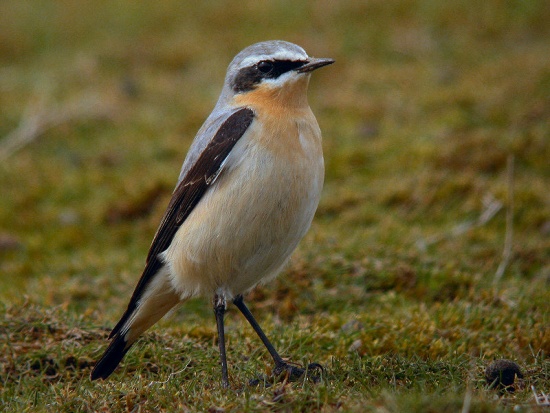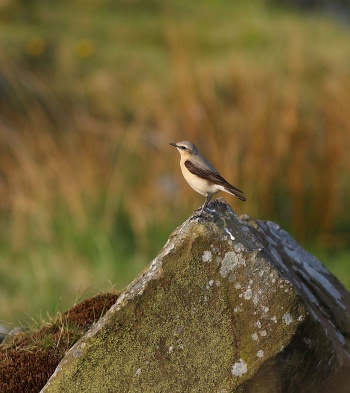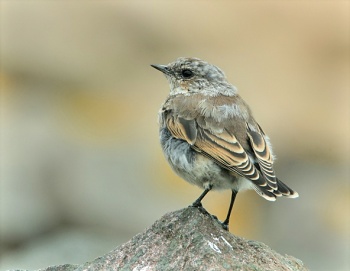(Taxonomy) |
|||
| Line 1: | Line 1: | ||
| − | |||
[[Image:Northern_Wheatear.jpg|thumb|550px|right|Photo by {{user|Paul+Hackett|Paul Hackett}}]] | [[Image:Northern_Wheatear.jpg|thumb|550px|right|Photo by {{user|Paul+Hackett|Paul Hackett}}]] | ||
;[[:Category:Oenanthe|Oenanthe]] oenanthe | ;[[:Category:Oenanthe|Oenanthe]] oenanthe | ||
| Line 19: | Line 18: | ||
==Taxonomy== | ==Taxonomy== | ||
| + | ''Oenanthe oenanthe'' has four subspecies:<sup>[[#References|[1]]]</sup> | ||
| + | *''O. o. leucorhoa'' | ||
| + | :*North-eastern [[Canada]] to [[Greenland]] and [[Iceland]]; migrates to western [[Africa]] | ||
| + | *''O. o. oenanthe'' | ||
| + | :*[[British Isles]] to [[Mediterranean]] and [[Siberia]]; migrates to central [[Africa]] | ||
| + | *''O. o. libanotica'' | ||
| + | :*Southern [[Spain]] and Balearic Is. to [[Iran]], [[Kazakstan]] and [[Mongolia]] | ||
| + | *''O. o. seebohmi'' | ||
| + | :*[[Morocco]] to north-eastern [[Algeria]]; migrates to [[Mauritania]] | ||
==Habitat== | ==Habitat== | ||
Rocky tundra, barren slopes, hill pastures, sand dunes. | Rocky tundra, barren slopes, hill pastures, sand dunes. | ||
| Line 25: | Line 33: | ||
Diet includes insects, some berries. | Diet includes insects, some berries. | ||
====Breeding==== | ====Breeding==== | ||
| + | Nest is on ground on dry tundra, usually in hole in a wall, under stones, or in old rabbit burrow. and is a cup of grass, twigs, weeds, lined with finer material such as moss, lichens, rootlets. The clutch is usually 5-6 pale blue eggs; unmarked or with fine reddish brown dots which are incubated by the female for 13-14 days. | ||
[[Image:Juv WheatearSP079421C.jpg|thumb|350px|right|Photo by {{user|Nigel+Kiteley |Nigel Kiteley }}<br />Juvenile, Draycote Water]] | [[Image:Juv WheatearSP079421C.jpg|thumb|350px|right|Photo by {{user|Nigel+Kiteley |Nigel Kiteley }}<br />Juvenile, Draycote Water]] | ||
| − | |||
==Vocalisation== | ==Vocalisation== | ||
<flashmp3>Oenanthe oenanthe (song).mp3</flashmp3><br /> | <flashmp3>Oenanthe oenanthe (song).mp3</flashmp3><br /> | ||
''[[Media:Oenanthe oenanthe (song).mp3|Listen in an external program]]'' | ''[[Media:Oenanthe oenanthe (song).mp3|Listen in an external program]]'' | ||
==References== | ==References== | ||
| − | #Wikipedia | + | #{{Ref-Clements6thDec08}}#Wikipedia |
#Birdwatchers Pocket Guide ISBN 1-85732-804-3 | #Birdwatchers Pocket Guide ISBN 1-85732-804-3 | ||
#houghtonmifflinbooks | #houghtonmifflinbooks | ||
Revision as of 20:00, 9 April 2009

- Oenanthe oenanthe
Identification
14½–16 cm length
White rump, basal tail patches with black centre and terminal band.
Breeding Male
- Grey upperparts
- Buff throat
- Black wings and face mask
- White stripe above the eye
Female
- Sandy-brown above and buff below
- Eye patch and wings are brown
Autumnal male, female and juvenile are browner in the autumn.
Distribution
Europe, Asia, Canada and Greenland.
Taxonomy
Oenanthe oenanthe has four subspecies:[1]
- O. o. leucorhoa
- O. o. oenanthe
- British Isles to Mediterranean and Siberia; migrates to central Africa
- O. o. libanotica
- O. o. seebohmi
- Morocco to north-eastern Algeria; migrates to Mauritania
Habitat
Rocky tundra, barren slopes, hill pastures, sand dunes.
Behaviour
Diet
Diet includes insects, some berries.
Breeding
Nest is on ground on dry tundra, usually in hole in a wall, under stones, or in old rabbit burrow. and is a cup of grass, twigs, weeds, lined with finer material such as moss, lichens, rootlets. The clutch is usually 5-6 pale blue eggs; unmarked or with fine reddish brown dots which are incubated by the female for 13-14 days.
Vocalisation
<flashmp3>Oenanthe oenanthe (song).mp3</flashmp3>
Listen in an external program
References
- Clements, JF. 2008. The Clements Checklist of Birds of the World. 6th ed., with updates to December 2008. Ithaca: Cornell Univ. Press. ISBN 978-0801445019.
- Wikipedia
- Birdwatchers Pocket Guide ISBN 1-85732-804-3
- houghtonmifflinbooks
- Collins Field Guide 6th Edition
External Links





